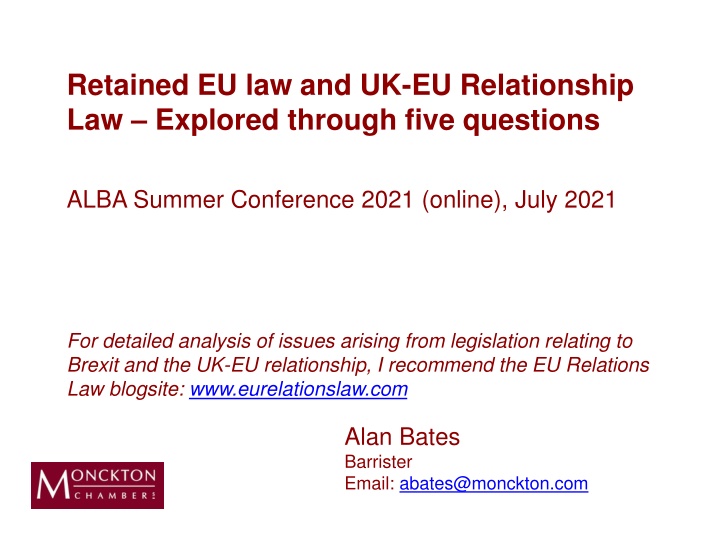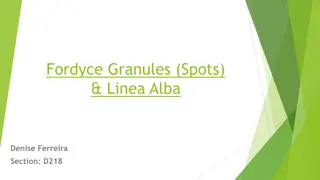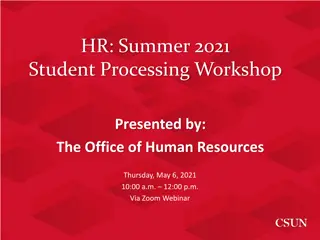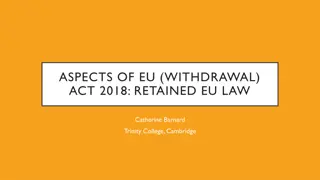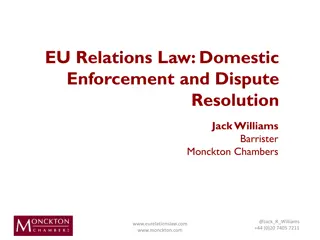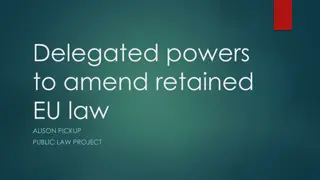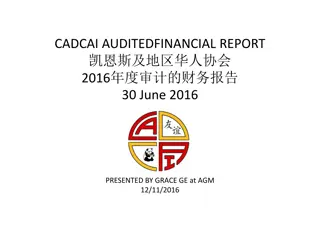Retained EU Law and UK-EU Relationship: ALBA Summer Conference 2021 Insights
Delve into the complexities surrounding Retained EU law and the UK-EU relationship through a detailed analysis of key questions discussed at the ALBA Summer Conference 2021. Explore topics such as the application of EU law, departure from CJEU case law, remedy of deficiencies in Retained EU law, devolution issues, and the implementation of the UK-EU Trade & Cooperation Agreement.
Download Presentation

Please find below an Image/Link to download the presentation.
The content on the website is provided AS IS for your information and personal use only. It may not be sold, licensed, or shared on other websites without obtaining consent from the author.If you encounter any issues during the download, it is possible that the publisher has removed the file from their server.
You are allowed to download the files provided on this website for personal or commercial use, subject to the condition that they are used lawfully. All files are the property of their respective owners.
The content on the website is provided AS IS for your information and personal use only. It may not be sold, licensed, or shared on other websites without obtaining consent from the author.
E N D
Presentation Transcript
Retained EU law and UK-EU Relationship Law Explored through five questions ALBA Summer Conference 2021 (online), July 2021 For detailed analysis of issues arising from legislation relating to Brexit and the UK-EU relationship, I recommend the EU Relations Law blogsite: www.eurelationslaw.com Alan Bates Barrister Email: abates@monckton.com
FIVE QUESTIONS For cases relating to events before IPCD, can you rely on EU law simpliciter rather than Retained EU law? When will UK courts depart from relevant CJEU case- law? The power in s.8 WA for Ministers to remedy deficiencies in Retained EU law what is a deficiency and how wide is the discretion as to remedy? Devolution and the s.12 power to make freezing regulations will regs be made, and with what effects? Future Relationship Act s.29 how much work will it do to implement the UK-EU Trade & Cooperation Agreement (TCA)?
When does Retained EU Law, rather than EU law, apply?
Was Green LJ right in Lipton? Can you rely on EU law simpliciter (rather than Retained EU Law - Amended Regulations) where cause of action arose before IPCD? Interesting recent judgment of Geraint Webb QC (Dep HCJ) in Varano v Air Canada [2021] EWHC 1336 (QB) hint of disagreement, but considered Green LJ s analysis to be part of the ratio (paras 72-73) Interpretation Act 1978, s16: rights which have accrued under a repealed statute remain enforceable unless the contrary intention appears in the repealing Act
When will UK courts depart from CJEU case-law?
Power to depart from CJEU case-law Section 6(3) WA: lower courts bound to decide any Qs as to meaning or effect of Retained EU Law in accordance with CJEU judgments handed down prior to IPCD as those judgments are themselves Retained Law But UKSC not bound: s.6(4)(a) S.6(4)(ba) Minister can provide for other courts not to be bound EWCA
When will power to depart be used? EUWA (Relevant Court) Regs 2020 Reg.5: In deciding whether to depart from any retained EU case law by virtue of s6(4)(ba), a relevant court must apply the same test as [UKSC] when deciding whether to depart from [its own] case law 1966 Practice Statement / Horton v Sadler [2006] UKSC 27 at [29] with great caution
Tune-In v Warner Music [2021] EWCA Civ 441 Arnold LJ - multi-factorial: No change in the domestic legislation so wording was the same Relevant int l law framework unchanged CJEU had particular experience in the area Distinguished academic commentary went both ways No assistance from non-EU foreign courts as their legislation was different Legal uncertainty would cause problems Vos MR: International harmony; not impeding the proper development of law or achieving results contrary to public policy Rose LJ
The power to remedy deficiencies in retained EU law
Remedying deficiencies (1) S.8 EUWA 2018: power for UK government to make regulations to correct any failure of retained EU law to operate effectively, or any other deficiency, after IPCD resulting from the UK's withdrawal from the EU as the Minister considers appropriate to prevent, remedy or mitigate the deficiencies Cannot be used to amend Devolution Acts 2 year limit (from IPCD) for exercising the power
Remedying deficiencies (2) Devolution: DAs powers to make regulations under s.8 when acting alone are subject to additional restrictions Must be within devolved competence Must not be contrary to any freezing regs made under s.12 Prior modifications to Retained Law made by UK Ministers effectively take precedence The Good Law Project challenge to the Subsidy Control Regulations policy choices to move away from shadowing EU law
Restricting the powers of devolved legislatures Freezing Regulations
Devolution and Brexit: the problem The devolution settlement was designed on the assumption that the UK would remain an EU Member State s.2(2) ECA 1972 Many non-reserved competences can affect UK internal market UK Internal Market Act only a partial solution (mutual recognition and non-discrimination) Common frameworks will take time to develop
Freezing regulations - s.12 EUWA 2018 Section 12 EUWA amends Devolution Acts provisions providing for devolved legislatures to have no competence to legislate incompatibly with EU law, so as to apply to certain Retained EU law Policy areas An Act of the Assembly cannot modify, or confer power by subordinate legislation to modify, retained EU law so far as the modification is of a description specified in regulations made by a Minister of the Crown within 2 years of 1 Jan 2020 (so by 1 Jan 2022); 5 year max duration But does not apply to any modification so far as it would, immediately before exit day, have been within the Assembly's legislative competence
Effects of s.12 freezing regulations Where UK government has not made freezing regulations protecting the relevant Retained EU law, a "returning" EU power will divest with the devolved legislature by default, even where it was not previously within its legislative competence But where a freeze is in place, the devolved legislatures and ministers will be required to comply with retained EU law, as they were up to 31 Dec 2020, or, where the UK Parliament legislates to diverge from retained EU law after the end of the transition period, to comply with any obligations that this divergence establishes
UK Internal Market Act (UKIMA) Part 1: UK market access: goods. Introduces the market access principles of mutual recognition and non-discrimination (both direct and indirect) for goods Part 2: UK market access: services. Provides similar rules for mutual recognition of authorisation requirements by services regulators, and for non- discrimination in the regulation of services But mutual recognition and non-discrimination principles cannot do all that is needed to protect the UK internal market, so more will be needed (perhaps with freezing regs in the meantime?)
Giving effect to the UK-EU Trade & Cooperation Agreement
Future Relationship Act 2020, s.29 Gives effect to UK-EU Trade & Cooperation Agreement and Security Procedures Agreement : Existing domestic law has effect with such modifications as are required for the purposes of implementing in that law the [Agreements] so far as the agreements concerned is not otherwise so implemented and so far as such implementation is necessary for the purposes of complying with the international obligations of the United Kingdom under the agreement. Eg: PPN 02/21 para 10 Utilities Contracts
Thank you for listening Alan Bates Email: abates@monckton.com
